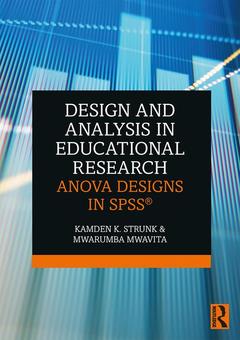Design and Analysis in Educational Research ANOVA Designs in SPSS®
Auteurs : Strunk Kamden K., Mwavita Mwarumba

NEW: updated eResources, 'Case Studies for Teaching on Race, Racism and Black Lives Matter.' Please see Support Material tab to download the new resources.
This book presents an integrated approach to learning about research design alongside statistical analysis concepts. Strunk and Mwavita maintain a focus on applied educational research throughout the text, with practical tips and advice on how to do high-quality quantitative research.
Design and Analysis in Educational Research teaches research design (including epistemology, research ethics, forming research questions, quantitative design, sampling methodologies, and design assumptions) and introductory statistical concepts (including descriptive statistics, probability theory, sampling distributions), basic statistical tests (like z and t), and ANOVA designs, including more advanced designs like the factorial ANOVA and mixed ANOVA, using SPSS for analysis. Designed specifically for an introductory graduate course in research design and statistical analysis, the book takes students through principles by presenting case studies, describing the research design principles at play in each study, and then asking students to walk through the process of analyzing data that reproduce the published results. An online eResource is also available with data sets.
This textbook is tailor-made for first-level doctoral courses in research design and analysis, and will also be of interest to graduate students in education and educational research.
FRONTMATTER:
- Acknowledgements
BASIC ISSUES
- Basic Issues in Quantitative Educational Research
- Sampling & Basic Issues in Research Design
- Basic Educational Statistics
- Introducing the Null-Hypothesis Significance Test
- Comparing a Single Sample to the Population using the one-sample z-test and one-sample t-test
- Comparing two samples means: The independent samples t-test
- Independent samples t-test Case studies
- Comparing more than two means: The one-way ANOVA
- One-way ANOVA Case Studies
- Comparing means across two independent variables: The factorial ANOVA
- Factorial ANOVA Case Studies
- Comparing two points from the same sample (within-subjects comparison) using the paired samples t-test
- Paired samples t-test Case studies
- Comparing more than two points from within the same sample: The within-subjects ANOVA
- Within-subjects ANOVA case studies
- Mixed between- and within-subjects designs using the mixed ANOVA
- Mixed ANOVA Case Studies
- Quantitative Methods for Social Justice and Equity: Theoretical and practical considerations
- A1 - z Table
- A2 - t Table
- A3 - F Table
- A4 - HSD Table
- B1 – Statistical Notation and Formulas
- References
NULL HYPOTHESIS SIGNIFICANCE TESTING
BETWEEN-SUBJECTS DESIGNS
WITHIN-SUBJECTS DESIGNS
CONSIDERING EQUITY IN QUANTITATIVE RESEARCH
APPENDICES
Kamden K. Strunk is an Associate Professor of Educational Research at Auburn University, where he primarily teaches quantitative methods. His research focuses on intersections of racial, sexual, and gender identities, especially in higher education. He is also a faculty affiliate of the Critical Studies Working Group at Auburn University.
Mwarumba Mwavita is an Associate Professor of Research, Evaluation, Measurement, and Statistics at Oklahoma State University, where he teaches quantitative methods. He is also the Founding Director of the Center for Educational Research and Evaluation (CERE) at Oklahoma State University.
Date de parution : 04-2020
17.4x24.6 cm
Disponible chez l'éditeur (délai d'approvisionnement : 14 jours).
Prix indicatif 53,83 €
Ajouter au panierDate de parution : 04-2020
17.4x24.6 cm
Disponible chez l'éditeur (délai d'approvisionnement : 14 jours).
Prix indicatif 160,25 €
Ajouter au panierThème de Design and Analysis in Educational Research :
Mots-clés :
Null Hypothesis Significance Test; Statistics; LGBTQ Student; SPSS; Pre-test Post-test Design; quantitative research; ANOVA Design; educational research; Random Assignment; research design; Scheffe Post-hoc Tests; hypothesis testing; Bonferroni Pairwise Comparisons; sampling; Global Severity Index Scores; ANOVA; Factorial ANOVA; data variables; SPSS Output; covariance; Familywise Error; correlation; Greenhouse Geisser Correction; statistical notation; Simple Effects Analysis; Levene's Test; Source Table; Mixed ANOVA; Effect Size Estimate; Mauchly's Test; Post-hoc Tests; Disordinal Interaction; Bonferroni Inequality; Independent Samples T-test; Central Tendency Estimates; Conceptual Knowledge Test
